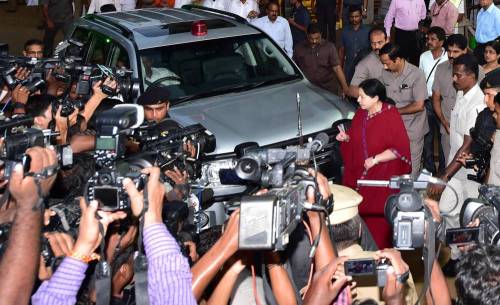 The Supreme Court granted bail to former Tamil Nadu chief minister J. Jayalalithaa, convicted of possessing assests disproportionate to her known sources of income.
The Supreme Court granted bail to former Tamil Nadu chief minister J. Jayalalithaa, convicted of possessing assests disproportionate to her known sources of income.
Alongwith Jayalalithaa, her aide Sasikala Natarajan and two others have also been granted bail.
An apex court bench headed by Chief Justice H.L. Dattu said that all four will be released on bail subject to the satisfaction of the condition by the trial court.
The court made it clear that Jayalalithaa and three others will complete their appeal with all relevant documents before the high court in a matter of two months and thereafter, it will ask the high court to expedite and complete the hearing on the appeal within three months.
The court told senior counsel Fali S. Nariman, appearing for Jayalalithaa, that it will not grant a day more to his client if they don’t complete the paperwork of their appeal before the high court with all the documents within a span of two months.
Jayalalithaa is presently in a Bangalore jail after her conviction in the disproportionate assets case. The former chief minister was awarded four-year prison term and a fine of Rs.100 crore.
She had moved to the Supreme Court Oct 9 seeking the bail.
Jayalalithaa, along with her aide Sasikala Natrajan, V.K. Sudhakaran and J. Ilavarasi, Oct 7 were refused bail by the Karnataka High Court which held that there were no grounds for granting bail.
Besides her health grounds, Jayalalithaa has invoked section 389 of the Code of Criminal Procedure seeking the suspension of her sentence and grant of bail till the pendency of her appeal against the trial court order.
The high court Oct 7, while declining bail to Jayalalithaa and three others, had relied on apex court orders as it ruled that putting the sentence on hold after an appeal is filed against the trial court order was not automatic. It had said that plea for bail after the conviction was different from the plea for bail while the trial was on.
It had also cited the apex court ruling that “corruption amounts to violation of human rights and leads to economic imbalances”.
In the 18 year old disproportionate assets case, the trial court in Bangalore Sep 27, convicted Jayalalithaa for possessing assets disproportionate to her known sources of income and sentenced her to four jail term and Rs. 100 crore fine.
The case against Jayalalithaa and three others related to period from 1991 to 1996 involving Rs. 66.65 crores when she became chief minister for the first time.